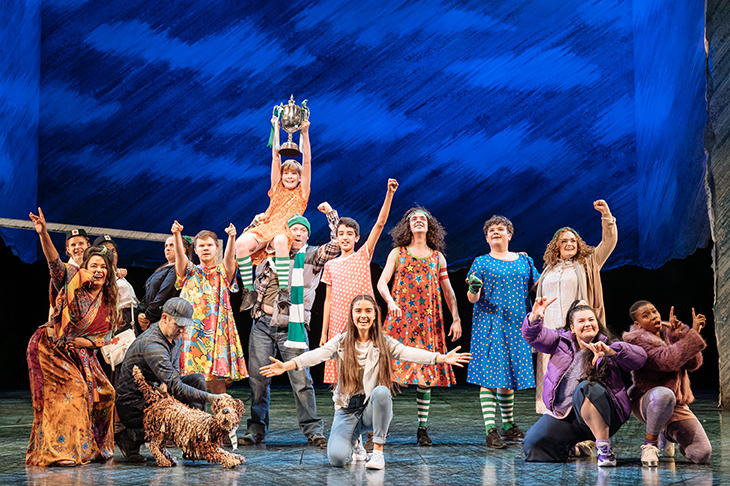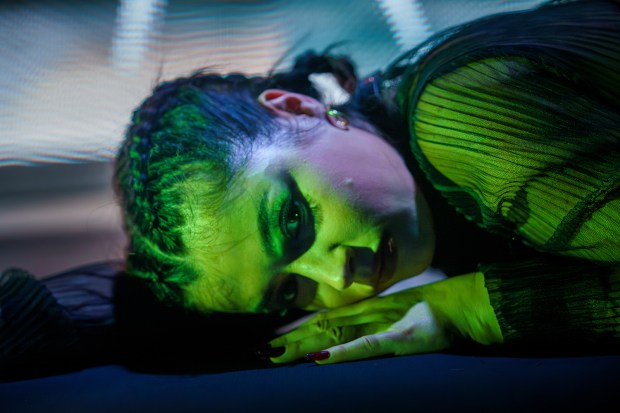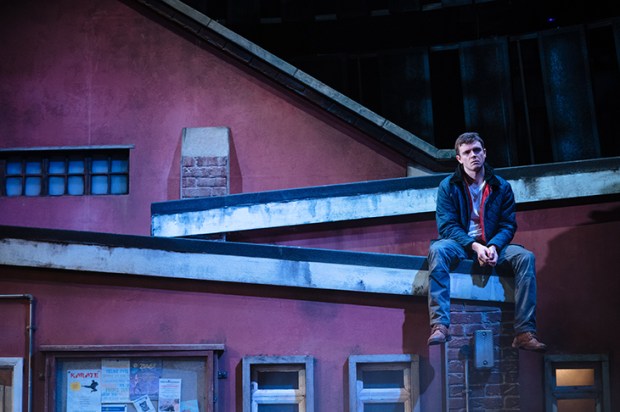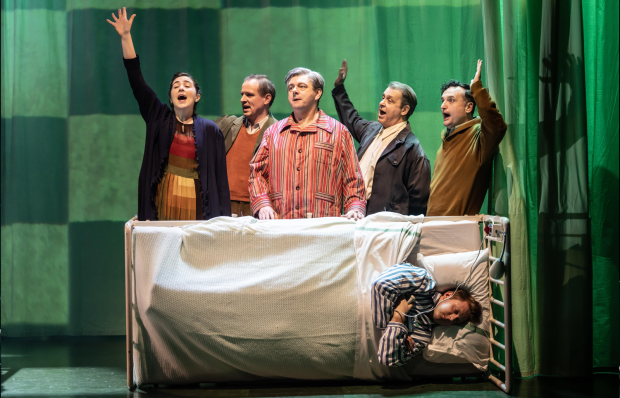David Walliams is one of the biggest-selling children’s authors in the world (having shifted some 25 million copies in more than 50 languages). And he’s now become the first children’s novelist since Roald Dahl to have their book turned into a full-scale RSC musical extravaganza.
As fun as these big musicals might be, they aren’t something the RSC takes lightly. Not only has the head honcho, Gregory Doran, decided to direct The Boy in the Dress himself, he’s also hired some serious talent. Robbie Williams — probably not seen in Stratford-upon-Avon since Take That were an up-and-coming boy band — has co-written the songs. Mark Ravenhill, the 1990s playwright best known for his tales of jaded shaggers, adapts the text. That’s quite the team.
Has it paid off? You bet. The Boy in the Dress is an absolute belter. Smart, catchy, funny and beautifully imagined. Much of that is down to Doran himself. It isn’t just that the show looks good. It’s how joyfully the whole thing comes together. A decent chunk of the plot revolves around football matches, something that could easily have bogged the production down. Yet these scenes zip by with circus-like energy. He’s got a brilliant cast too: 17-year-old Miriam Nyarko, one of three rotating actresses playing the female lead, gives the kind of performance you feel obliged to mention by name — just so you can act a bit smug when they make it big. My goodness can she sing.
Walliams’s book is a celebration of tolerance and diversity, but it’s not worthy. There’s an intriguing Dahl-esque cynicism to the worlds he creates. Just look at the way he writes adults. When Dennis, the play’s hero, is banned by his father from buying fashion magazines, he reminds his dad of his own secret collection of top-shelf magazines. At the end of the play, when the disciplinarian headmaster turns out to be a secret crossdresser, Dennis, little mister tolerance that he is, decides to use the information to extort concessions from him. Interesting message that: adults are hypocrites, so why not blackmail them?
The question isn’t whether The Boy in the Dress will end up in the West End (that much seems a given), but just how long it might run when it gets there. Matilda, its big cousin, is pushing a decade now. Might this give it a run for its money? Maybe.
Someone who definitely isn’t a boy in a dress is Travis Alabanza, the writer and performer behind Burgerz. Alabanza, as we’re reminded several times, identifies as gender non-binary. They don’t use gendered pronouns (opting for the singular ‘they’ rather than he or she) and don’t take kindly to being misgendered (witness the fuss two years ago when Alabanza was asked to leave the Topshop changing rooms).
Burgerz is a show about another incident. During a stroll through central London, Alabanza was hit by a burger thrown — with a side order of homophobic insults — by a stranger. Rather clunkily, Burgerz begins with a lengthy explanation not just of the assault (which is at least vaguely interesting) but of the premise of the show itself. After the incident, Alabanza explains, they became obsessed with burgers, figuring that by better understanding the item in question they might be able to process the situation. It’s a slightly odd set-up admittedly.
After ten minutes or so, they ask for a volunteer to join them on stage to help construct a burger from scratch. Several hands go up, but Alabanza dismisses them. The volunteer has to be cisgender (i.e. non-trans) white male, Alabanza says — and they never volunteer for this kind of thing apparently. Except, well, they do. From a quick glance around the stalls, I can count half a dozen with their hands up (probably keen to show off their progressive credentials). Yet Alabanza carries on with the script, insisting they’re all too chicken. Of course there’s a chance the bearded chap in row C is also gender non-binary. It can be hard to tell.
Alabanza is a natural performer, so it’s a shame Burgerz feels so much like a lecture rather than theatre. They fixate too heavily on the societal factors that might have influenced someone to throw a burger at them — something which rather lets the culprit off the hook and will bore non-sociologists. At one point there’s even a suggestion that radical feminists (who tend to be dismissive of the idea that gender can be put on and cast off at will) might bear some of the responsibility: as if the assailant might have been radicalised by reading Julie Bindel.
From time to time, Alabanza even castigates the audience directly for their bigotry, implying that had the audience been present they’d have failed to help Alabanza. An odd accusation to make against a crowd who’ve paid money to see a show about gender non-conformity. How do the audience respond? With a tearful standing ovation. It’s an odd response to an even odder evening.
Got something to add? Join the discussion and comment below.
Get 10 issues for just $10
Subscribe to The Spectator Australia today for the next 10 magazine issues, plus full online access, for just $10.
You might disagree with half of it, but you’ll enjoy reading all of it. Try your first month for free, then just $2 a week for the remainder of your first year.














Comments
Don't miss out
Join the conversation with other Spectator Australia readers. Subscribe to leave a comment.
SUBSCRIBEAlready a subscriber? Log in